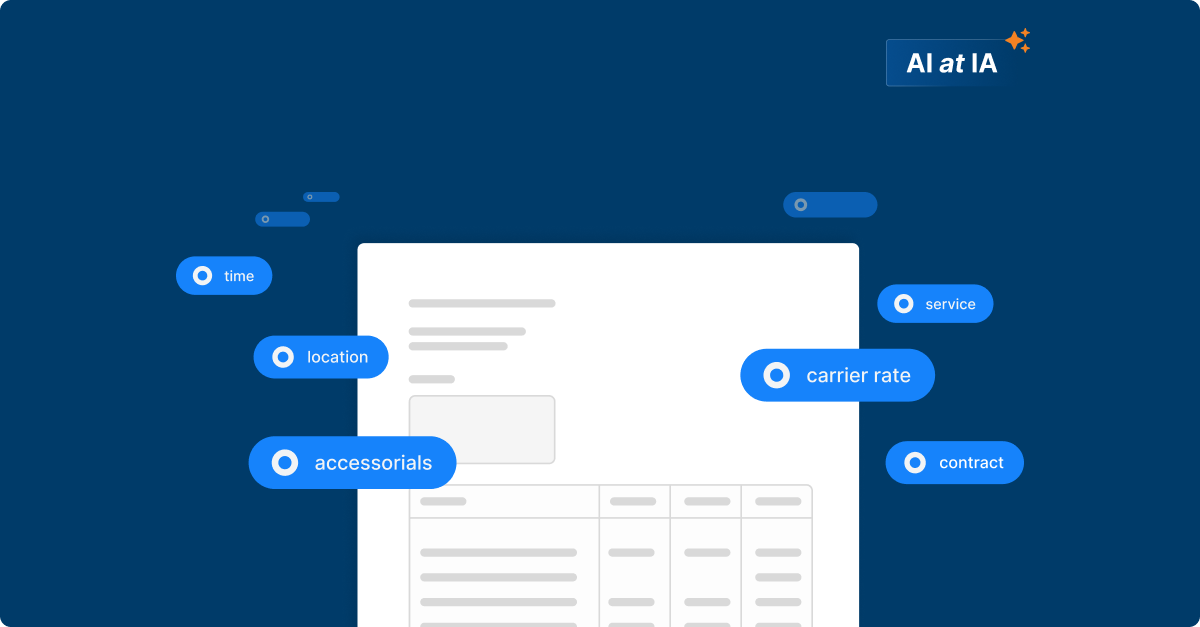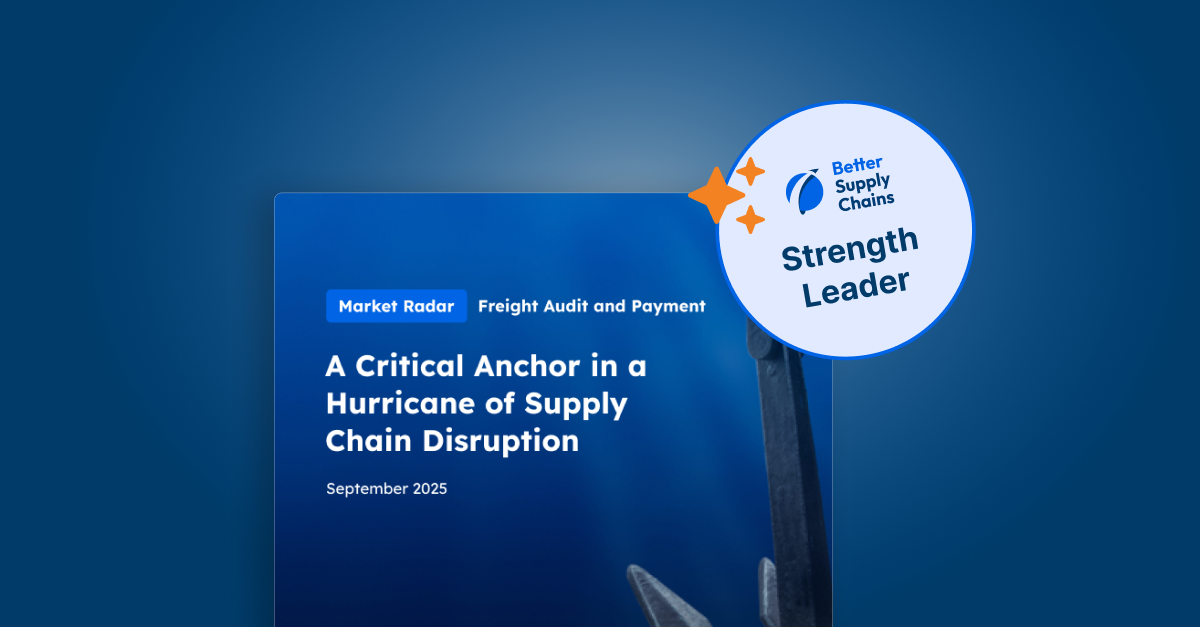Using Advanced Freight Auditing to Limit Freight Invoice Discrepancies

Many businesses overlook the impact of freight audits and payments on their expenses. That’s quite surprising, considering that 80% of carrier invoices contain discrepancies within the complex global shipping domain.
Shippers and third-party logistics providers (3PLs) must diligently address billing errors. These inaccuracies jeopardize their financial stability, potentially costing tens of thousands of dollars, and impede operational efficiency. Therefore, timely resolution of such issues is critical to prevent excessive financial losses or worse.
Freight audits play a critical role in this landscape, enabling businesses to identify overcharges, recover unwarranted expenses, and protect revenue. Moreover, they enhance operational efficiency, increase supply chain transparency, and bolster relationships with logistics partners.
To excel in the competitive shipping industry, mastering freight auditing is paramount.
This article will analyze the world of advanced freight auditing and showcase the power of machine learning, automation, and business intelligence in resolving invoice discrepancies. By embracing these innovative solutions, businesses can reduce overpayments, optimize operations, and pave the way for a thriving future.
What Causes Freight Invoice Discrepancies?
Freight invoice discrepancies pose challenges for shippers, impacting their bottom line and carrier relationships. Preventing errors necessitates understanding root causes and identifying key contributing factors. Here are ten common reasons for freight invoice discrepancies:
- Accessorial Charges, Fees, & Waivers: Increases in surcharges and fees, driven by market fluctuations and diesel prices, complicate manual freight accounting and can lead to discrepancies.
- Duplicate Invoices: Frequently occurring in the retail supply chain, similar orders to the same destination can generate unnoticed duplicate invoices, causing overpayment or record-keeping confusion.
- Corrected Invoice Fees: Corrected invoices with revised fees can introduce new errors or perpetuate existing ones if not adequately reviewed.
- Weight Accuracy: Errors can occur when entering weight information, causing discrepancies in freight invoices. Inaccurate weight data can lead to overcharges or disputes with carriers.
- Late Payment Fees: Inaccurate application of late payment fees or deviations from agreed-upon terms can create invoice discrepancies and potentially strain relationships with carriers.
- Payment Terms: Ensuring accurate and timely payments is crucial for maintaining credibility among competitors and customers. Deviations from agreed-upon payment terms can result in invoice discrepancies.
- Billing Terms: Miscommunication or misunderstandings related to billing terms can lead to errors in invoicing and eventual discrepancies.
- Rate Variance: With each shipment requiring unique quotes, shippers must recognize that rates will not always be the same. Failure to account for rate variances can result in erroneous invoices.
- Service Failure Refunds: Shippers may be entitled to refunds when carriers fail to meet their service commitments. Discrepancies can occur if refunds aren't correctly handled or carriers challenge the claims.
- Incorrectly Billed Collect Shipments: Errors in billing collect shipments, such as miscommunication between parties or incorrect data entry, can result in discrepancies that require close attention and resolution.
How Advanced Freight Auditing Limits Freight Invoice Discrepancy
Advanced freight auditing is a cutting-edge solution that leverages cloud-based technology and integrates three transformative technologies: machine learning, automation, and business intelligence. By harnessing the power of these tools, freight audit companies can quickly detect and resolve invoice discrepancies, ensuring that shippers can identify overcharges, mitigate risks, and improve their shipping operations.
Machine learning analyzes large datasets to quickly and comprehensively identify inconsistencies like duplicate charges or inaccurate weights. Freight audit companies can then automate the freight bill audit process to ensure accurate rates, promote contract compliance, and prevent disputes. Business intelligence tools transform raw data into valuable insights, empowering shippers to make informed decisions that optimize cost efficiency and carrier performance and uncover growth opportunities and operational improvements.
While effective collaboration and open communication between shippers, carriers, and freight audit companies are vital for resolving invoice discrepancies, strengthening stakeholder relationships, and enhancing shipping efficiency, these three technologies are the backbone of advanced freight auditing's significance.
Machine Learning Quickly Detects Anomalies
In the freight audit process, machine learning proves invaluable in swiftly detecting anomalies by analyzing extensive data and recognizing patterns that might elude human auditors. For example, machine learning algorithms can identify excessive mileage fees, enabling businesses to pinpoint potential overcharges. In addition, rapid anomaly detection allows companies to address issues before they escalate, conserving both time and resources.
Freight audit companies utilize technology to automate freight invoice analysis, continuously collecting and scrutinizing invoice data. Machine learning identifies discrepancies in real-time among vast volumes of relevant information, catching overspending and alerting shippers to issues they might not have discovered independently. Quick problem identification prevents overspending from spiraling out of control. In other words, it helps companies tackle concerns before they escalate further, ultimately enhancing efficiency and cost-effectiveness.
Automation Leads to Efficiency
Advanced freight auditing software mitigates freight invoice discrepancies by streamlining the audit process, reducing manual intervention, and minimizing human error.
Automation helps address labor shortages in the shipping industry while enabling fast data analysis and real-time visibility into freight charges. Logistics professionals are genuinely concerned about the current shortage of 80,000 drivers, the projected shortfall of 160,000 drivers by 2030, and the accompanying shortage of warehouse workers.
Thus, a growing demand exists for software that can optimize operations and streamline supply chains, improving efficiency and enabling businesses to overcome these obstacles. One such solution that addresses these concerns is freight audit software. This software can help companies to identify inefficiencies and make informed decisions to improve their logistics operations by providing data-driven insights and automating the audit process.
In the current climate of labor shortages, companies are under pressure to maximize their resources, minimize costs, and maintain a high level of service. Optimizing operations and streamlining supply chains with efficient software solutions becomes paramount to achieving this goal.
Business Intelligence Ensures Smarter Shipping
Business intelligence (BI) tools provided by top freight audit companies enable shippers to make well-informed decisions by delivering valuable insights into shipping operations. Adopting BI allows businesses to identify trends, monitor performance, and fine-tune supply chain strategies. Including BI in logistics enhances efficiency and offers a competitive edge by making data-based decisions.
In the logistics industry, business intelligence is crucial in promoting transportation optimization, establishing it as a vital influencer in logistics and shipping management. Thanks to real-time data, users can manage by exception, obtain automated recommendations, and assess trade-offs before making transactions. BI's significance in the logistics sector is evident, contributing to seamless operations and enhanced strategies.
Focusing on intelligence and shipping data analytics is essential for shippers due to challenges in processing extensive supply chain data, market fluctuations stemming from ongoing disruptions, uncertainties around trade regulations and global tariff policies, and the increasing agreement on the necessity of shipping analytics tools for maintaining a competitive edge. Utilizing BI tools, companies can expedite replenishment, increase visibility, employ proactive, automated corrections, elevate customer satisfaction, and reduce transportation costs, resulting in a more efficient and successful logistics operation.
What Do Freight Audit Services Providers Offer Shippers?
Shippers can leverage advanced tools and expertise offered by freight audit service providers to optimize shipping operations and minimize costs to audit freight invoices. These providers employ cutting-edge technology and industry knowledge to uncover and resolve discrepancies. Shippers can improve their logistics operations' efficiency by adopting a continuous, data-driven approach to freight audits.
A key advantage of employing a freight audit company is quickly pinpointing and addressing various invoice discrepancies, thereby conserving time and resources. The freight bill auditing process also unveils unusual spending patterns, enabling shippers to make informed decisions regarding transportation cost optimization. Freight audit companies ensure that shippers are well-equipped to tackle the most common freight invoice overcharges and any other discrepancies that may surface.
Beyond executing thorough freight invoice audits, providers offer supplementary services to enhance shipping operations further. These services use machine learning algorithms to detect invoice anomalies automatically and real-time freight spending visibility tools. Additionally, freight audit service providers guide shippers in optimizing their logistics networks and support them in handling loss and damage claims, holding carriers accountable for any issues encountered.
A Stronger Partnership Can Drive Greater Control Over Freight Invoices
Companies must embrace advanced freight auditing solutions to reduce invoice discrepancies and enhance shipping operations. By integrating a freight audit system that leverages machine learning, automation, and business intelligence, businesses can ensure accurate billing, protect revenue, and make well-informed shipping decisions.
By identifying trends and patterns in freight expenses, advanced freight auditing allows companies to proactively address inefficiencies and potential risks within their supply chain. Doing so improves carrier relationships, contract negotiations, and financial management.
Through advanced freight auditing, companies gain greater control over their supply chain, diminish the risk of overcharges, and acquire valuable insights into their shipping operations. As a result, they can make data-driven decisions that optimize efficiency and positively impact their bottom line.
Investing in advanced freight auditing is not just a cost-saving measure; it's a strategic move that can significantly enhance your company's overall performance.
Don't let invoice discrepancies hinder your business's growth. Experience the benefits of advanced freight auditing by partnering with Intelligent Audit today. Elevate your shipping operations, decrease discrepancies, and enhance your competitive advantage – seize the opportunity to transform your logistics for a brighter future.



